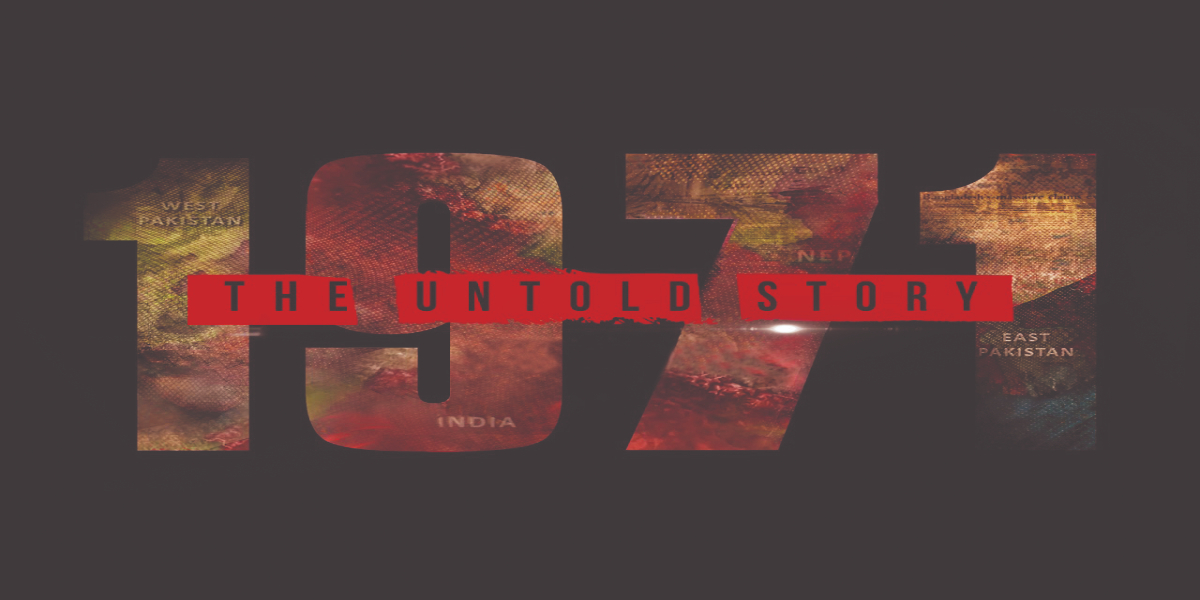It was after a hiatus of two years that the cinema hall was packed with intellectuals, producers and writers. People usually go to the movie theatre for two reasons: they might be the director’s friend or when they’re looking to have a good time consuming the entertainment it has to offer. But, this time the approach was different, at least for me, or maybe for all of the attendees who attended the special screening of Separation of East Pakistan – The Untold Story, it was to know and understand the chapters of history which were never unfolded to Pakistanis.
Most individuals from my generation and the younger generation would not pay much heed to the subject since they have been taught that ‘history is dry and boring.’ But Jabbar’s “Separation of East Pakistan – The Untold Story” is a fine and brilliant collection of voices from both ends – Bangladesh and Pakistan.
The documentary is divided into chapters, just like a book, to further clarify the subjects and topics discussed. Ace journalists, authors, bureaucrats and Jabbar himself have appeared narrating the history. What has set the documentary at par was the voice of veterans from Bangladesh which not only adds a spark of authenticity and unbiasedness but establishes a need to listen and understand the main conflict from both sides.
Written and produced by Javed Jabbar, a writer and a former senator, the documentary encapsulated the events from history that touched many hearts and minds. Talking about East Pakistan and the adjacent events were considered taboo since we are trained to brush political issues under the carpet and become ostriches who put their head on the ground. Such a futuristic nation we are? But not anymore.

Now the cinema industry has decided to plan the future of cinema by decoding the past and its many mysteries, openly talking about them through visual representations and urging the generation to come to raise questions and think so a healthy debate starts for the betterment of the country.
The narrative that was built and exaggerated over the years ended up being termed as offensive, never to be revised, debated or corrected. Through the current efforts of Pakistani cinema, people are finally revisiting these conversations. This could also be the first time that Pakistani people are acknowledging the fiftieth anniversary of East Pakistan’s separation.
A number of conflicts were discussed and raised in the documentary with the help of archives, documents, and book references. It also touches on the issue of how various entities have painted Pakistan as a culprit in an attempt to continue sabotaging the image of the country which has not halted until today. The lie sprouted and since there wasn’t much documented in Pakistan of the truth related to East Pakistan’s separation, the lie was nurtured and the narrative was steered by India that it eventually ended up becoming the believed and accepted story. Therefore, India projected itself as the savior and supporter of the Bengalis and projected Pakistan as the wrongdoer. But that doesn’t mean Pakistan’s role in these events was free of flaws.
It was high time that an unbiased and bold point of view came forward. Although the documentary didn’t showcase any gruesome visuals or bloodshed, yet the seriousness of the content kept the viewer’s intact until the end.
The calamities of war are always tumultuous for a nation and its people, and it was no different during the events of 1971. Not acknowledging these awful events is a great injustice to the lives that were lost or forever altered on both sides. On the other hand, while tensions within the nation had been bred long ago, facing our own political or martial failings that transformed the unrest into an all-out war is crucial for moving forward.
Many would deem the rejection of Sheikh Mujibur Rahman’s Six-Point formula and identifying him as a separatist in the turning point for unrest, fueled further by General Yahya Khan’s inept grip on an already sensitive situation, ranging from operation searchlight to his crackdown on Mujibur Rahman.
The culmination of all missteps and inadequacies led to yet another tragic independence event in the subcontinental region, and the loss of life was prevalent throughout. The documentary also sheds light on the politicisation and militarisation of youth during that time. Furthermore, the subjugation of women, often the collateral damage in any war, had the most harrowing tales of rape and torture, especially those belonging to low-income Bengali and Bihari families.
As the documentary ended, the hall echoed with applause to appreciate the efforts of Jabbar to bring the unbiased story to the masses. People gathered around Jabbar outside the hall to congratulate him and thank him for coaching them through the documentary. It was relatable to a lot of families who shared their experience of how they lost their families and suffered collateral damage. Each individual seemed to become a fan of him whereas he politely and patiently gave his time to every attendee who would come to him for a selfie, feedback or a comment.
The documentary comes at a time when the topic was just retouched upon by another cinematic endeavour, igniting a mass conversation amidst many people throughout social avenues. And as these events are being discussed again, something that wasn’t always acceptable to talk about, one can’t help but consider the possibility of a future where we face the past in its entirety and come to terms with it. Only then, can we as a nation, begin to heal.
[embedpost slug=”/eastern-eyes-top-50-asian-celebrities-list-sajal-aly-and-other-pakistani-actors-make-it-to-top-10/”]

















